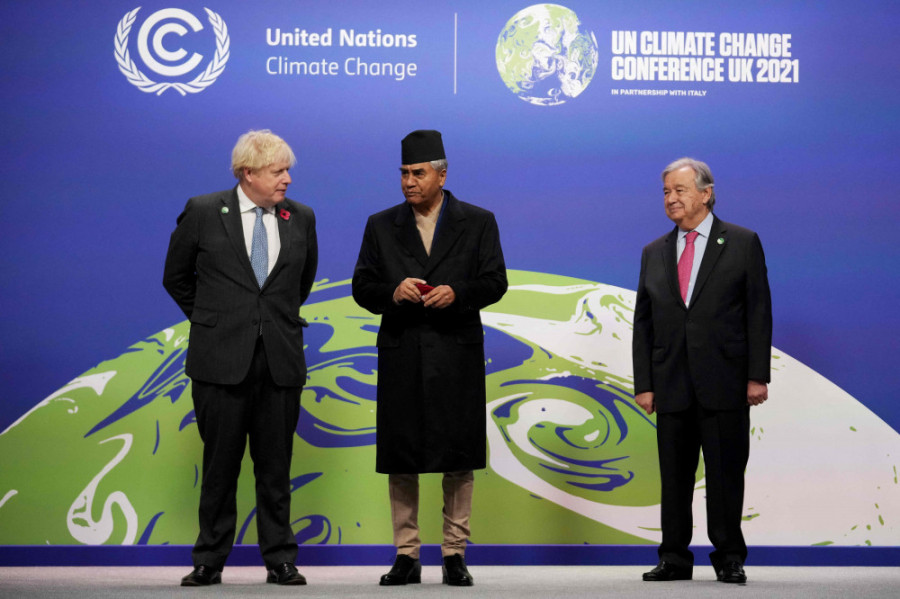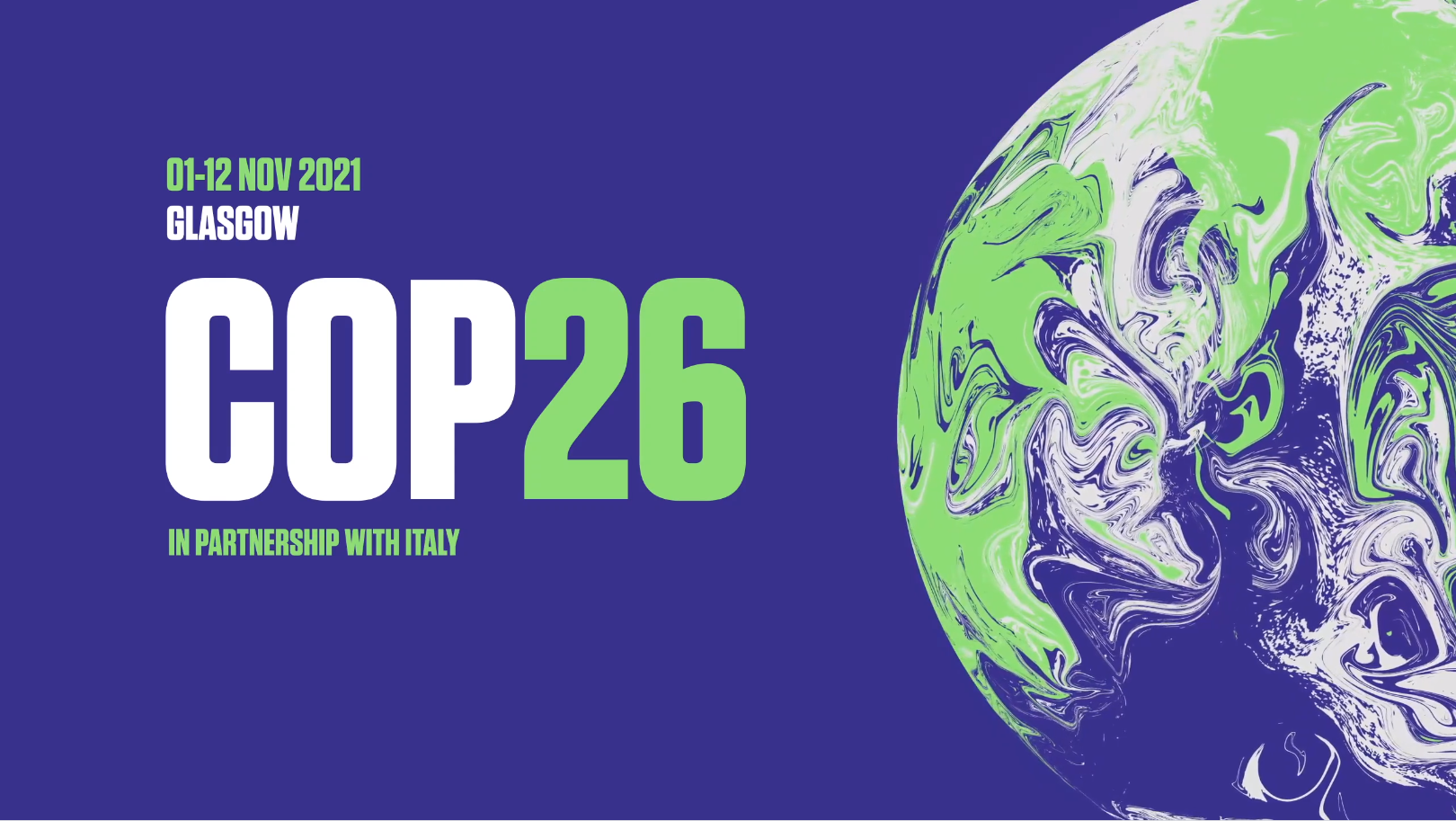The 26th conference of the parties (COP) to the UN Framework Convention on Climate Change (UNFCCC) opened with the event’s President Alok Sharma putting Nepal on the spotlight.
“On a visit to Jomsom in Nepal, in the Hindu-Kush region, I spoke to communities literally displaced from their homes from a combination of droughts and floods,” he said.
Sharma was in Nepal in February this year to understand the effects of global warming on mountainous communities first-hand. Sharma’s mention of Nepal, according to officials, put the Himalayas at the center of the global climate agenda, and set the tone for the conference to ratchet up ambition to limit global temperature rise.
Negotiators were also made aware of the dire situation of the planet ahead of the global conference in Glasgow by the UN’s environment agency, UNEP. Its annual Emissions Gap Report suggested that the world was on course to a warming of around 2.7 C with potentially highly destructive impacts.
Research has shown that a one-degree rise in average global temperature translates to a much higher increment in temperatures in the mountains, triggering various natural disasters in mountainous countries like Nepal.
Addressing the summit, Prime Minister Sher Bahadur Deuba urged world leaders to recognize specific climate vulnerability of the high mountains and prioritize the mountain agenda in all climate-related negotiations. PM Deuba said keeping global temperature rise to below 1.5° Celsius was vital for the mountain people.
Maheshwar Dhakal, fromer UNFCCC focal person for Nepal and head of the climate change division at the Ministry of Forest and Environment, says more effort is needed to highlight the mountain agenda in the international forum. “We have been raising this issue for long but it has never been heeded,” says Dhakal, who is now member-secretary at the President Chure Tarai-Madhes Conservation Fund. In comparison, the likes of Bhutan and Bangladesh have been much more effective in highlighting their plight in international climate forums.

Though the government is raising the issue of the impact of climate change in the Himalayas, there is a shortfall of research in the area, says former member of the National Planning Commission Krishna Prasad Oli. “Due to climate change, there is a danger of glacier outbursts and avalanches in the Himalayan region,” he says. “But do we have proper research to back that up to show the international community? No.”
Climate finance was another vital issue raised by Nepal at the summit. PM Deuba said, “We have mechanisms to ensure that international climate finance is channeled to support transformational approaches in implementing adaptation, mitigation, and disaster management actions together.”
In 2009, developed countries had agreed to give $100 billion a year by 2020 to help poorer countries fight climate change. But the developed countries are yet to fulfill their promise. The Glasgow pact now pushes the deadline to 2023.
Loss and damage caused by climate change was another agenda that Nepal, along with other Least Developed Countries, raised. PM Deuba called upon the parties to make loss and damage a stand-alone agenda for negotiations and to support the framework of additional financing for it. Nepal is of the view that there should be adequate support for adaptation in the most vulnerable countries by scaling up financial, technological, and capacity-building resources.
In the meeting of the Least Developing Countries (LDC) held prior to the summit, Sonam Wangdi, chair of the LDC group, said, “Dealing with the loss and damage caused by the climate crisis is a top priority for vulnerable countries. Years of inadequate action on climate change means that it is no longer possible to mitigate or adapt to wholly avoid irrevocable harms, costs, and losses from climate change.” Wangdi said finance and technical support to address loss and damage are urgently needed.
However, the Glasgow pact makes no mention of funds to deal with the loss and damage due to climate change. Critics say there was not even a promise to set up a financial mechanism to deal with the issue as developed countries feared incalculable fines if the UN accepted financial compensation for historical emissions.

The politics of ‘net-zero’
Ahead of COP26, many countries jumped on the bandwagon to announce dates to achieve ‘net-zero’ (absorb more greenhouse gases from the atmosphere than they emit). While the UK and the US set net zero target for 2050, India set its for 2070. Critics argue that big emitters are just shifting the responsibility of taking urgent action by coming up with net-zero dates. Deadlines of decades don’t make sense when the world is faced with extreme impacts of climate change in the present.
Nepal, meanwhile, committed to net-zero by 2045. Earlier, Nepal had promised the milestone by 2050. A senior government official at the Ministry of Forest and Environment requesting anonymity says the target is not pragmatic. “We are in the process of establishing new industries, urbanization is gaining pace and the number of vehicles is increasing, which means we are going to emit more,” says the official. “We should have set the target of 2050 or 2055 at the earliest.”
Following the summit’s conclusion, even UN Secretary-General Antonio Guterres expressed his disappointment.
He said in a statement, “The approved texts are a compromise. They reflect the interests, the conditions, the contradictions and the state of political will in the world today. They take important steps, but unfortunately the collective political will was not enough to overcome some deep contradictions… Our fragile planet is hanging by a thread. We are still knocking on the door of climate catastrophe.”
He spelled out what should have happened at the summit, “I reaffirm my conviction that we must end fossil fuels subsidies. Phase out coal. Put a price on carbon. Build resilience of vulnerable communities against the here and now impacts of climate change. And make good on the USD 100 billion climate finance commitment to support developing countries…”
When the conference concluded, COP President Sharma described the pact as an “incredibly delicate balance—if any of us tug at that, it will unravel all too easily”.
The people of Jomsom, if they could understand what this means for them, would be disappointed.
Ringside view from COP 26
Dr. Radha Wagle, Joint Secretary, Climate Change Management Division, Ministry of Forest and Environment
This time we had made comprehensive preparations by working on various thematic areas. There was sufficient time to prepare as there was no COP summit last year due to Covid-19. We had worked on 10 thematic areas.
We raised our climate change agenda through the Least Developed Countries (LDC) group, G-77, and other multilateral and bilateral platforms. Just before COP26, Nepal witnessed two extreme events—flooding in Melamchi and extreme rainfall in October—causing immense damage to lives and livelihoods. So we presented these examples of how climate change is affecting us. We took a firm stand that global temperature rise should be kept under 1.5 C, as targeted by the Paris Climate Agreement 2015.
Another major agenda that Nepal and other LDC countries raised is that of climate finance. Let us say a foundation has been laid on this. Without enough funds, we cannot implement the programs that we have chosen for adaptation and mitigation. In the coming years, we expect developed countries to meet their monetary commitments to poor countries.
Loss and damage were other issues we flagged at the UN Summit. Some progress has been made in this issue but a lot still needs to be done. Similarly, we have said that there should be a clear demarcation between regular aid and climate finance that countries provide us. Mountains are obviously another prominent issue that we raised.
In a nutshell, from our perspective, COP26 has been very successful. As there was participation from the prime minister’s level, a lot of bilateral meetings were also held. We also signed some climate change-related agreements.












